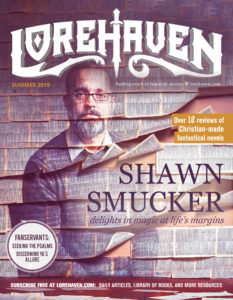The Power of Apologetics Fiction
To understand my proposed genre of apologetics fiction, I’ll first refer to the parable of the Good Samaritan. It begins this way:
But he [a certain lawyer], willing to justify himself, said unto Jesus, “And who is my neighbour?”
And Jesus answering said, “A certain man went down from Jerusalem to Jericho, and fell among thieves, which stripped him of his raiment, and wounded him, and departed, leaving him half dead . . .”1
If you’re like most Christians, you’re probably very familiar with that story. But have you ever stopped to think of how Jesus was a master storyteller? Not only was he amazing at telling stories that gripped his hearers, he used those stories to convey theological truths.
The greatest stories do more than entertain; they help to connect the head to the heart.
This week, stop by the Lorehaven Book Clubs group to connect with Keith A. Robinson, and explore Logic’s End and other works of apologetics fiction.
Famed apologist Ravi Zacharias often says that the work of an apologist is to do more than simply defend the Christian faith using logic and reason. An apologist must connect the head (logic and reason) to the heart (center of emotions).
As a Christian spec-fic author, this is my passion and calling. I don’t want to simply entertain my readers. I want to point them to transcendent truths about our amazing God. I want to tell powerful stories that lead my readers to understand our Creator in new ways. In addition, I have a specific calling to help Christians have confidence that our faith is based upon sound logic and reason.
To accomplish this, I propose a new genre called apologetics fiction.
The word apologetics comes from the Greek word apologia, which means a defense or justification of a belief or idea.
Apologetics, then, is the branch of theology concerned with the defense or proof of Christianity.
Apologetics fiction takes apologetics arguments and repackaging them in exciting novels.
Let’s face it—we all love a good story! Many of us (particularly young people) are just not interested in reading non-fiction. Christians throughout the centuries, from Thomas Aquinas and Justin Martyr, to C. S. Lewis, Josh McDowell and Lee Strobel, have written numerous powerful works demonstrating time and again how orthodox Christianity makes sense of the world and is based upon historical, scientific, and logical grounds. Yet those great works will go unread by many, especially in our entertainment-saturated culture.
But if we throw in dragons, elves, pirates, spaceships, robots, strange creatures, exotic locations, and most importantly, exciting characters and engaging plots, we could reach a whole group of people with some of these truths.
Many may frown upon so-called “agenda fiction,” and I understand their skepticism. I’ve read some books that have attempted to incorporate apologetics, but do so in a way that is—shall we say—less than exciting. But that doesn’t mean it can’t work. If done properly, the inclusion of apologetics propels the story along. The dialogue between characters can be natural, not forced. Good apologetics fiction is designed to whet the appetite of the reader, not give a full treatise on a topic.
I’ve had numerous young people come up to me over the years and tell me how much they not only loved my stories, but they said the apologetics in the books has helped to strengthen their faith. I even had a young man tell me, “Your books have helped to shape my theology.”
This is what excites me about writing. Well-designed stories have a way of grabbing our imaginations and helping us to remember what we learned. A good analogy can go far in teaching a specific idea, and a good story can forever ingrain a truth in our minds and spirits.
We need to know not only what we believe, but we need to know why we believe it. I’m convinced one of the reasons we are losing so many young people from the church is that they haven’t been shown the why. I may not be able to answer all their questions in a novel, but if I can get them thinking and seeking answers, that’s a step in the right direction.
Does that mean authors who write exciting stories with Christian themes should switch to incorporating apologetics? Not necessarily. We are the body of Christ, and we each have our own role to play. You can’t put into a novel what you don’t possess. If you are an author who loves apologetics, then definitely consider it.
But I would definitely encourage authors to not be afraid to incorporate deep conversations about spiritual matters in their books. C. S. Lewis definitely didn’t shy away from doing so. There are many profound truths in his novels, some of which are simply found in a single line of text.
The ultimate teacher himself, Jesus, used stories and parables to present the truths of the gospel. I hope to merely emulate his example for His glory and the furtherance of His kingdom. I pray other authors will join me. As Christian authors, we need to do more than entertain. We need to imbue our stories with truths that point readers to our Master. And for the readers out there, don’t just settle for fluff. Seek out those stories that connect your head and your heart. They are out there.
Soli Deo gloria.
- Luke 10:25–37. ↩







































Yes! This is all a way of “sneaking past watchful dragons,” as Lewis put it. Thanks.
What are some good examples of apologetics fiction that I can use with my students?
That’s the question, I guess. ARE there any good examples of apologetics fiction that don’t feel like the author is turning to the camera and going CHECKMATE ATHEISTS
Depends on the definition of “apologetics fiction.” I think it’s a mistake to write a story based on an idea you’re trying to convince people of. But if a story is written, and an idea erupts naturally from the story, that can be powerful, persuasive, even “apologetic”-like.
Good stories represent truth.
The definition given in this article strikes me as unclear and possibly bordering propaganda fiction (maybe the author can give a bit more clarity or insight to what he meant here?–maybe I’m misconstruing). I hate propaganda fiction. It makes my gag-reflex kick in. It’s also extremely unhelpful because the few people it does “help” are the people who already agree, and it only really “helps” them feel more dogmatic about their shared belief. The general result of that is that they push other people away, though there are instances when standing firm in what you think can actually draw people to you, and I’m not denying that the Gospel lived out in a real life draws people to the truth of God. Only that propaganda doesn’t result in Gospel lived out.
Notleia, you make me laugh sometimes–and I do agree that apologetics sometimes wanders into Alice-in-Strawmanland…
One problem with the cruddier apologetics fiction is that it often doesn’t give enough room to significantly challenge the views of the author. Or, even if it does, mostly everyone is brought around to the ‘right’ side at the end, and those that don’t are represented in some sort of bad light. And it does so in a way that doesn’t feel as real and authentic as it should.
Show don’t tell is very important. Putting the characters in an interesting situation and truly exploring what would realistically happen can go a lot way toward making the story better. Yes, authors can guide the characters’ paths in a way that helps prove a point, but if it doesn’t feel like it’s the honest thoughts, feelings, and growth of the character, the book’s point is going to be a lot harder to get behind.
That said, this isn’t just a Christian problem, though. Like, often enough, secular books will do similar things, just with a different belief system. Often enough, what people consider too preachy depends on how much they agree with the author.
[…] write in a genre I call apologetics fiction. It is fiction that weaves apologetics (answers to tough questions about God) into the plots in a […]